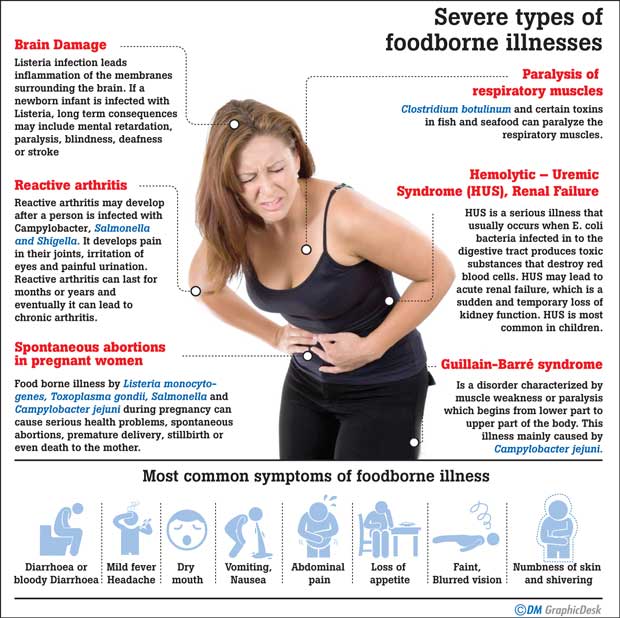09 Feb 2018 - {{hitsCtrl.values.hits}}

 Food is a major requirement for humans since it provides nutrients for energy, growth and maintenance of life. But at present food is a major threat to humans due to food poisoning. Patients present with the condition as a result of improper food handling and processing practices. Unsafe food can be the cause of or can contribute to many health, social and economic issues.
Food is a major requirement for humans since it provides nutrients for energy, growth and maintenance of life. But at present food is a major threat to humans due to food poisoning. Patients present with the condition as a result of improper food handling and processing practices. Unsafe food can be the cause of or can contribute to many health, social and economic issues.
Food borne illnesses
The World Health Organization (WHO) defines food borne illnesses as diseases, usually either infectious or toxic and caused by agents that enter the gastrointestinal (GI) tract through the ingestion of contaminated food or water which contains harmful biological and chemical residues.
Types of illnesses
Major causes
Pathogenic bacteria – Salmonella spp., Campylobacter jejuni, Escherichia coli, Listeria monocytognes, Vibrio spp., Shigella spp., Clostridium botulinum, Clostridium perfringens and Staphylococcus aureus etc.

Parasites – Cyclospora spp., Cryptosporidium parvum, Giardia intestinalis, Trichinella spiralis and Entamoeba histolytica etc.
How does food get contaminated?
Raw or under-cooked meat, poultry, beef, fish and shellfish, eggs, unpasteurized milk, dairy products, contaminated water, improperly canned or fermented food, improperly smoked and salted fish, unwashed fruits and vegetables, certain types of wild mushrooms, food prepared by a person infected with a virus and improper food packaging.
Vulnerable groups
Anyone can develop foodborne illness, but people in certain groups are more likely to fall sick and be seriously ill. They are; infants, young children, pregnant women, older adults and persons with chronic diseases.
Severe types
Most of foodborne illnesses are acute while rarely, foodborne illnesses may lead to more serious complications including;
Reactive arthritis may develop after a person is infected with Campylobacter, Salmonella and Shigella. It develops pain in their joints, irritation in the eyes and pain during urination. Reactive arthritis can last for months or years and eventually it can lead to chronic arthritis.
HUS is a serious illness that usually occurs when E. coli bacteria infects the digestive tract and produces toxic substances that destroy red blood cells. HUS may lead to acute renal failure, which is a sudden and temporary loss of kidney function. HUS is most common in children.
Listeria infection inflames the membranes surrounding the brain. If a newborn infant is infected with Listeria, long-term consequences may include mental retardation, paralysis, blindness, deafness or stroke.
Foodborne illness caused by Listeria monocytogenes, Toxoplasma gondii, Salmonella and Campylobacter jejuni during pregnancy can cause serious health problems, spontaneous abortions, premature delivery, stillbirth or even bring to death to the mother.
Clostridium botulinum and certain toxins in fish and seafood can paralyze the respiratory muscles.
It is a disorder characterized by muscle weakness or paralysis which begins from the lower part to upper part of the body. This illness is mainly caused by Campylobacter jejuni.
Symptoms
Food poisoning symptoms may range from mild to severe and may differ, depending on the cause of infection. The length of time it takes for symptoms to appear also varies and depends on the cause of the infection. But the typical time length can range from as short as 01 hour to as long as 28 days. Most common symptoms for foodborne illnesses are; diarrhea with or without blood, dry mouth, vomiting, nausea, abdominal pain, loss of appetite, mild fever, headache, feeling faintish, blurred vision, weakness, numbness of skin and shivering.
Diagnosis Methods
Diagnosis methods include the performing of physical examinations using signs, blood test and stool culture. These tests help in the identifying of pathogens.
Prevention
In conclusion, foodborne illnesses are a major factor related to public health and significantly contribute to the cost of health care. Each year a higher percentage of the human population is susceptible to falling sick due to food poisoning. However, foodborne illnesses are preventable by sticking with food safety practices. Safer food contributes to healthier and longer lives and less costly health care.
(The writer holds a Postgraduate Degree in Industrial and Environmental Chemistry from the University of Kelaniya and an Undergraduate Degree in Food Science and Technology Management from the Wayamba University of Sri Lanka)
23 Dec 2024 11 minute ago
23 Dec 2024 59 minute ago
23 Dec 2024 1 hours ago
23 Dec 2024 2 hours ago
23 Dec 2024 2 hours ago